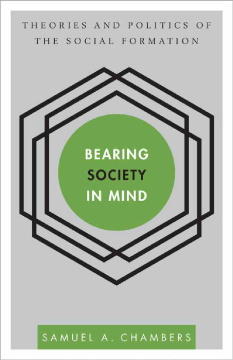
Additional Information
Book Details
Abstract
Political and economic models of society often operate at a level of abstraction so high that the connections between them, and their links to culture, are beyond reach. Bearing Society in Mind challenges these disciplinary boundaries and proposes an alternative framework—the social formation.
The theory of social formation demonstrates how the fabric of society is made up of threads that are simultaneously economic, political, and cultural. Drawing on the work of theorists including Marx, Althusser, Butler, Žižek and Rancière, Bearing Society in Mind makes the strongest case possible for the theoretical importance and political necessity of this concept. It simultaneously demonstrates that the social formation proves to be a very particular and peculiar type of “concept”—it is not a reflection or model of the world, but is definitively and concretely bound up with and constitutive of the world.
Samuel A. Chambers teaches political theory and cultural politics at Johns Hopkins University where he is an associate professor of political science. He is co-editor of the journal ‘Contemporary Political Theory’ and general series coeditor of the Routledge series, ‘Innovators in Political Theory’. His work is broadly interdisciplinary, ranging from philosophy of language, to feminist and queer theory, to critical television studies. He has published four books, ‘The Lessons of Rancière’ (2013), ‘Untimely Politics’ (2003); ‘Judith Butler and Political Theory’ (2008); and ‘The Queer Politics of Television’ (2009).
samuelachambers.com
In this astute and engaging new book Samuel Chambers shows how radical theory ‘after’ Marx can and must ‘return’ to Marx if it is to realize its critical potential. Chambers’ goal is not to reject movements such as post-structuralism but to retrieve and recreate for them the concept of ‘social formation’ through which we can see better the shape of the present and the kinds of action that open on to what comes next. The book sets out with clarity and conviction the challenge to which a serious contemporary political theory must rise.
Alan Finlayson, Professor of Political and Social Theory, University of East Anglia
